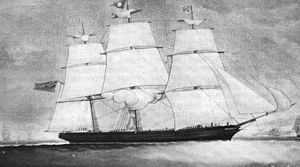This week in 1865 Welsh set sail to establish colony in Patagonia
This week, in 1865, the converted tea clipper Mimosa set sail to establish a Welsh speaking colony called in Welsh ‘Y Wladfa’ (‘The Colony’), in the valley of the Chubut River in Patagonia in Argentina. The Mimosa, embarked from Liverpool on 28 May 1865 with 153 emigrants aboard. They sailed to the coast of Patagonia, an area of Argentina which had by this time declared its independence from Spain in 1810. In the 1880s, a further colony was established in the foothills of the Andes and this was called ‘Cwm Hyfryd’ (‘Pleasant Valley’).
The emigrants wanted to set up a New Wales, free from English influence, where they could maintain Welsh culture, traditions and where the Welsh language, rather than English was the normal means of communication. A major motivation was, however, a desire for land and the Argentine government provided land for the emigrants close to the Chubut River in Patagonia. At that time little control was exercised by the government in Buenos Aires over the region. The land they encountered was barren and windswept, but was also inhabited by scattered communities of the Tehuelche people. It is reported that the Welsh established good relations with the Tehuelche. Nevertheless, the settlers faced many difficulties in the early years of the colony.
Despite these initial difficulties, they were able to irrigate the land and plant crops; more emigrants arrived from Wales and the colony became reasonably prosperous. Between 1865 and 1914 Welsh was the main language spoken in the lower Chubut valley. As time went on Welsh settlers in Patagonia became more explicitly part of Argentine society. Welsh is still spoken today, but when words are borrowed from a foreign language they are more likely to be from Spanish rather than from English. The people have developed a distinct dialect of Welsh, however speakers from Wales and Patagonia are able to communicate without difficulty.






